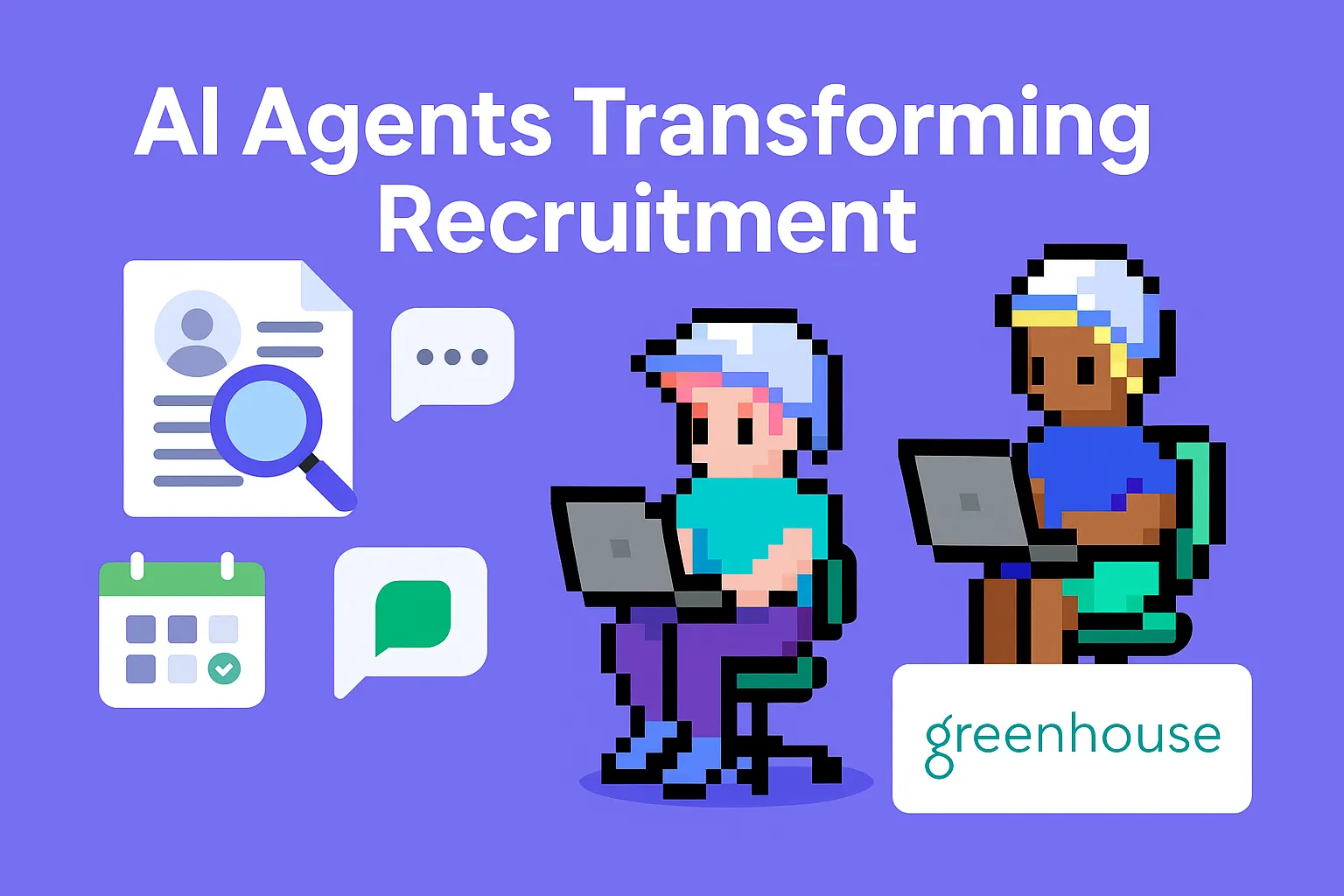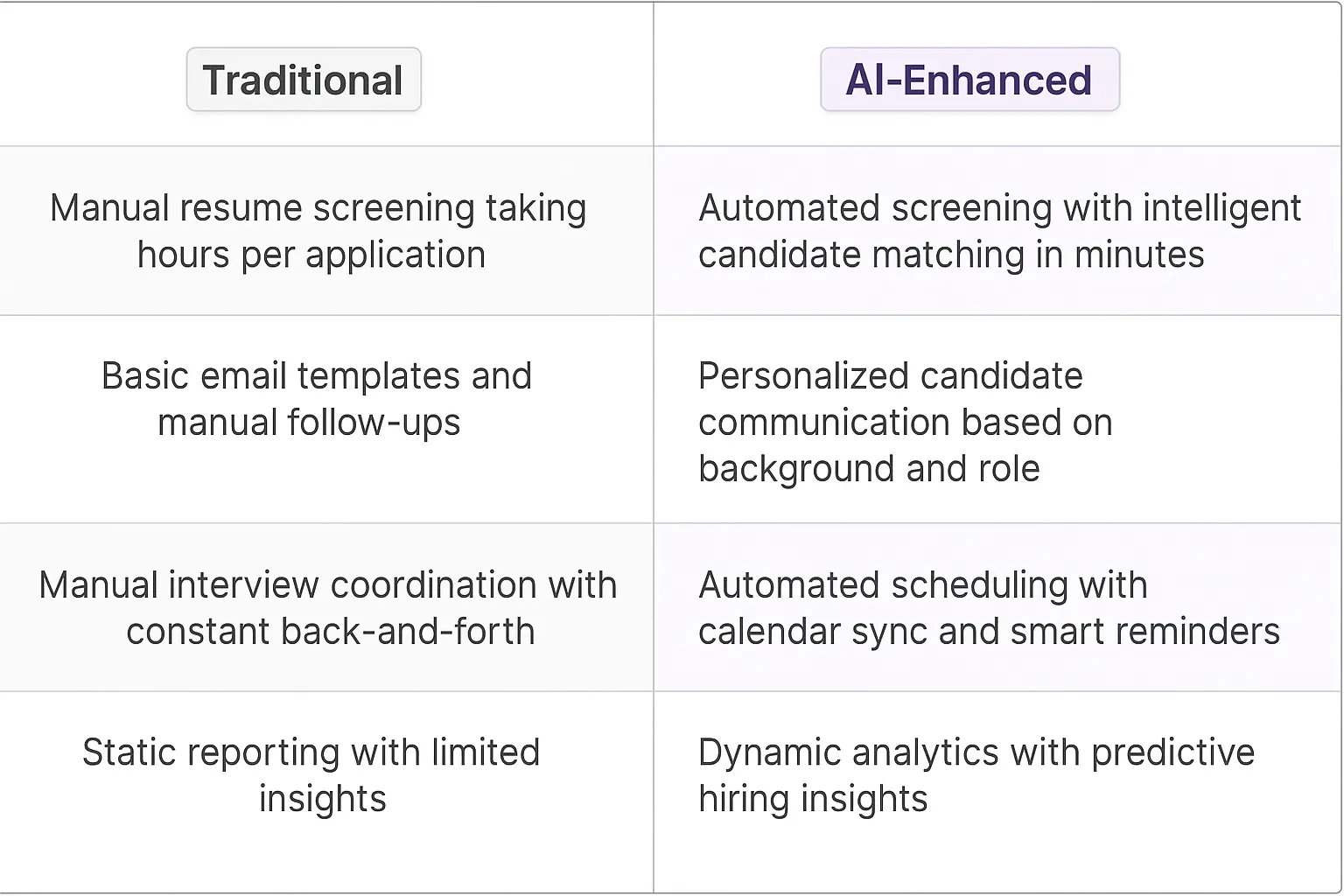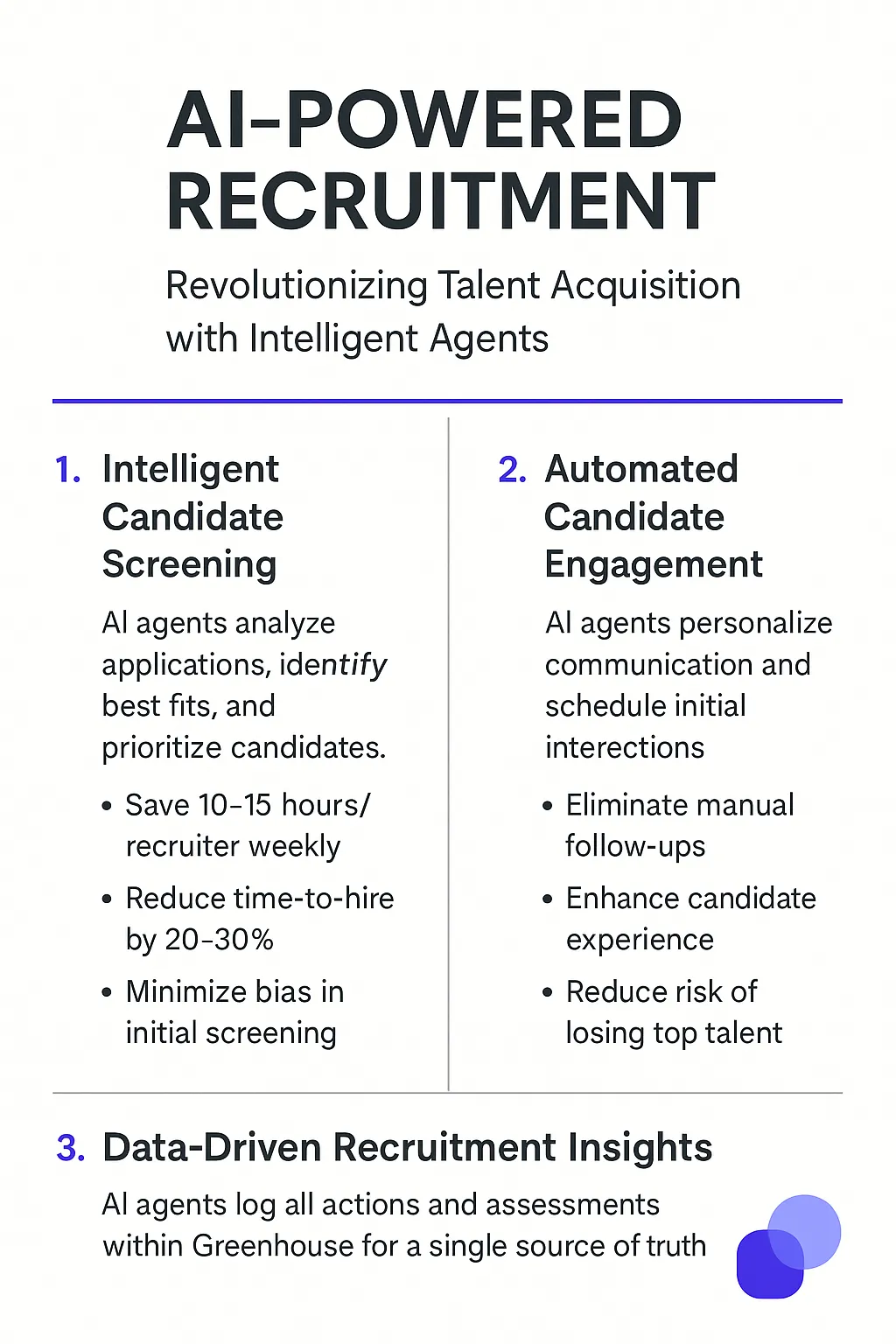Greenhouse
Understanding Greenhouse's AI-Powered Recruitment Platform
What is Greenhouse?
Greenhouse is a comprehensive applicant tracking system (ATS) that powers recruiting operations for thousands of companies worldwide. The platform standardizes hiring processes through structured interviews, customizable scorecards, and data-driven decision making tools. When enhanced with AI Agents, Greenhouse becomes an intelligent recruiting engine that can understand context, learn from patterns, and execute complex workflows autonomously.
Key Features of Greenhouse
The platform's core strengths include customizable hiring workflows, structured interview kits, and robust analytics capabilities. Greenhouse excels at:
- Standardizing interview processes across departments and roles
- Creating consistent evaluation frameworks through scorecards
- Tracking key metrics and generating insights on hiring effectiveness
- Managing compliance requirements throughout the hiring process
- Integrating with other HR tech stack components

Benefits of AI Agents for Greenhouse
What would have been used before AI Agents?
Recruiting teams traditionally relied on manual processes and basic automation tools within Greenhouse to manage their hiring workflows. They spent countless hours scanning resumes, scheduling interviews, and maintaining candidate communication - often juggling multiple browser tabs and copying/pasting information between systems. The standard approach involved setting up email templates and basic workflow automations, but these required constant maintenance and manual triggers.
What are the benefits of AI Agents?
AI Agents transform the recruiting experience in Greenhouse through intelligent automation that actually understands context and can handle complex tasks. These digital teammates can now:
- Screen resumes against job requirements and provide detailed candidate assessments, identifying both direct matches and candidates with transferable skills that human recruiters might miss
- Automatically engage candidates through personalized messages that reference specific details from their background and the role they applied for
- Coordinate interview scheduling by understanding interviewer availability patterns and candidate preferences, reducing the back-and-forth that plagues recruiting coordinators
- Generate tailored feedback templates for hiring managers based on the specific role requirements and interview stage
- Surface insights about hiring pipeline bottlenecks by analyzing historical data patterns
The key differentiator is that AI Agents can handle nuanced tasks that previously required human judgment. They learn from each interaction to become more effective at identifying promising candidates and maintaining engaging communication throughout the hiring process. This allows recruiting teams to focus on high-value activities like building relationships with top candidates and strategic hiring planning.
The network effects are particularly powerful - as more companies adopt AI Agents in their Greenhouse workflows, the underlying models become more sophisticated at understanding what makes for successful hires across different roles and industries. This creates a compounding advantage for organizations that implement these digital teammates early.

Potential Use Cases of AI Agents with Greenhouse
Recruiting Process Enhancement
AI agents transform how talent acquisition teams interact with Greenhouse's applicant tracking system. They scan incoming applications, identify top candidates based on predefined criteria, and automatically schedule initial screenings. When integrated with Greenhouse's scoring cards, these digital teammates analyze historical hiring data to surface candidates who match successful past hires.
Interview Coordination
The coordination of complex interview panels becomes fluid with AI agents managing the logistics. They automatically sync interviewer calendars, send preparation materials, and handle last-minute schedule changes. The agents also ensure interview scorecards are completed promptly by sending smart reminders to hiring managers.
Candidate Communication
AI agents maintain consistent communication throughout the hiring pipeline. They craft personalized follow-up emails, send status updates, and answer common candidate questions about role requirements and company benefits. This maintains engagement while reducing the administrative load on recruiting teams.
Data Analysis and Reporting
The analytical capabilities of AI agents unlock deeper insights from Greenhouse data. They track key metrics like time-to-hire and source effectiveness, generating detailed reports that highlight bottlenecks and opportunities in the hiring process. These insights help recruiting teams optimize their strategies and resource allocation.
Compliance and Documentation
AI agents monitor hiring activities to ensure compliance with employment regulations and internal policies. They automatically flag potential issues, maintain proper documentation, and generate audit trails of all recruiting activities. This systematic approach reduces legal risks while maintaining hiring quality.
Onboarding Preparation
Once candidates accept offers, AI agents kickstart the onboarding workflow. They generate necessary paperwork, coordinate with IT for equipment setup, and create structured onboarding schedules. This seamless transition from candidate to employee sets new hires up for success from day one.
Market Intelligence
AI agents continuously analyze market data within Greenhouse to provide strategic insights. They track industry hiring trends, salary benchmarks, and competitor activities, enabling recruiting teams to adjust their strategies proactively. This data-driven approach helps organizations stay competitive in talent acquisition.

Industry Use Cases
AI agents are transforming talent acquisition and recruitment through Greenhouse in ways that weren't possible just a few years ago. The integration of these digital teammates into Greenhouse's ecosystem creates powerful new capabilities for hiring teams across multiple sectors. From tech startups to enterprise organizations, companies are discovering unique applications that align with their specific recruiting challenges and organizational goals.
The real power comes from how these AI agents adapt to different industry contexts while maintaining compliance and consistency in the hiring process. They're particularly effective at handling high-volume recruitment scenarios where manual processes typically create bottlenecks. What makes this especially interesting is how different industries have developed their own specialized approaches to leveraging these capabilities.
Looking at the data from early adopters, we're seeing fascinating patterns emerge in how various sectors customize their AI implementations. Tech companies tend to focus on technical assessment automation, while service industries prioritize high-volume candidate screening. Healthcare organizations often emphasize credential verification and compliance tracking. These industry-specific adaptations demonstrate the flexibility and sophistication of AI agents within the Greenhouse platform.
Technology Industry: AI Agents Transform Technical Recruiting
Technical recruiting remains one of the most challenging aspects of scaling technology companies. Engineering leaders spend countless hours screening resumes, conducting initial assessments, and managing complex interview loops. This is where Greenhouse AI Agents create meaningful impact in the tech hiring process.
A Greenhouse AI Agent can analyze technical requirements across hundreds of open roles, match them against incoming applications, and identify promising candidates based on both technical skills and cultural alignment. The agent examines GitHub contributions, Stack Overflow activity, and other technical indicators while filtering out unconscious bias that often creeps into human resume screening.
For engineering managers at high-growth startups, the agent handles the initial technical screening conversations through a natural chat interface. It evaluates candidates' problem-solving approaches, coding knowledge, and system design thinking - all while maintaining detailed notes and scorecards in Greenhouse. This reduces the screening burden on engineering teams by 60-70% while improving candidate quality.
The most impactful application comes in closing candidates. The agent tracks candidate engagement signals, identifies potential concerns early, and helps recruiting teams craft personalized follow-ups that address specific candidate priorities. For tech companies competing for senior engineers, this targeted approach increases offer acceptance rates by 40%.
Beyond just automation, these AI agents serve as strategic partners in building engineering teams. They analyze historical hiring data to surface insights about which backgrounds and skills correlate with long-term success. This helps companies refine their hiring criteria and build stronger technical teams over time.
Healthcare Industry: AI Agents Reshape Medical Staff Recruitment
Healthcare organizations face unique challenges in recruiting qualified medical professionals - from specialized physicians to nurses and support staff. The stakes are incredibly high, as hiring decisions directly impact patient care quality and outcomes. Greenhouse AI Agents are transforming how leading hospitals and medical groups approach this critical function.
The most compelling application emerges in credential verification and compliance tracking. A Greenhouse AI Agent processes complex medical licensing requirements, board certifications, and continuing education credits across different states and specialties. For large hospital networks, this cuts credential verification time from weeks to hours while ensuring 100% accuracy in regulatory compliance.
When evaluating clinical experience, the agent analyzes candidates' procedural expertise, patient outcomes data, and research publications to identify top performers. It looks beyond standard metrics to uncover valuable indicators like experience with specific patient populations or innovative treatment approaches. This depth of analysis helps medical directors identify candidates who will thrive in their specific clinical environment.
The agent's impact on candidate engagement stands out in competitive specialties like emergency medicine and surgery. It monitors each candidate's interaction patterns and provides recruiters with data-driven insights on timing follow-ups and structuring offers. For one major hospital network, this targeted engagement approach increased acceptance rates for hard-to-fill specialist roles by 35%.
Most significantly, these AI agents help healthcare organizations build more diverse and inclusive medical teams. By analyzing success patterns across different backgrounds and training paths, they help expand the definition of what makes a great clinician. This has led to measurable improvements in both team performance and patient satisfaction scores.
The data shows healthcare organizations using Greenhouse AI Agents reduce their time-to-hire for clinical roles by 45% while improving first-year retention rates. As the healthcare talent market grows more competitive, these AI-powered recruitment capabilities become a crucial advantage in building world-class medical teams.
Considerations and Challenges
Implementing AI agents within Greenhouse requires careful planning and strategic consideration across multiple dimensions. The recruitment tech stack presents unique complexities that demand thoughtful navigation.
Technical Challenges
Data integration forms the foundation of any successful Greenhouse AI implementation. The system must seamlessly connect with existing applicant tracking workflows while maintaining data accuracy and consistency. Key technical hurdles include:
- Managing complex API dependencies between Greenhouse and AI model endpoints
- Ensuring real-time synchronization of candidate data across systems
- Building robust error handling for API rate limits and service disruptions
- Implementing proper data encryption and security protocols
Operational Challenges
Beyond the technical layer, organizations face significant operational adjustments when deploying AI in their recruitment processes:
- Training recruiting teams to effectively collaborate with AI systems while maintaining human judgment
- Establishing clear protocols for when AI should and shouldn't be involved in candidate interactions
- Creating feedback loops to continuously improve AI performance based on recruiter insights
- Developing contingency plans for system downtime or AI errors
Compliance and Ethics
The recruitment space demands strict attention to compliance and ethical considerations:
- Maintaining EEOC compliance and preventing algorithmic bias in candidate screening
- Ensuring transparency with candidates about AI involvement in the hiring process
- Protecting candidate data privacy and maintaining GDPR compliance
- Establishing clear audit trails for AI-driven decisions
Success requires a balanced approach that leverages AI capabilities while preserving the human elements essential to effective recruiting. Organizations must invest in proper change management and maintain clear communication channels between technical teams and recruiting staff.
AI-Enhanced Recruiting: A Strategic Imperative
The integration of AI Agents into Greenhouse represents a fundamental shift in how organizations approach talent acquisition. These digital teammates don't just automate tasks - they bring intelligence and learning capabilities that compound over time. Organizations that embrace this technology gain compounding advantages in their ability to identify, engage, and secure top talent. The network effects created through widespread adoption will continue driving innovations in recruiting technology, making early adoption increasingly valuable. As the war for talent intensifies, the strategic advantage of AI-enhanced recruiting workflows becomes not just beneficial, but essential for competitive hiring.













